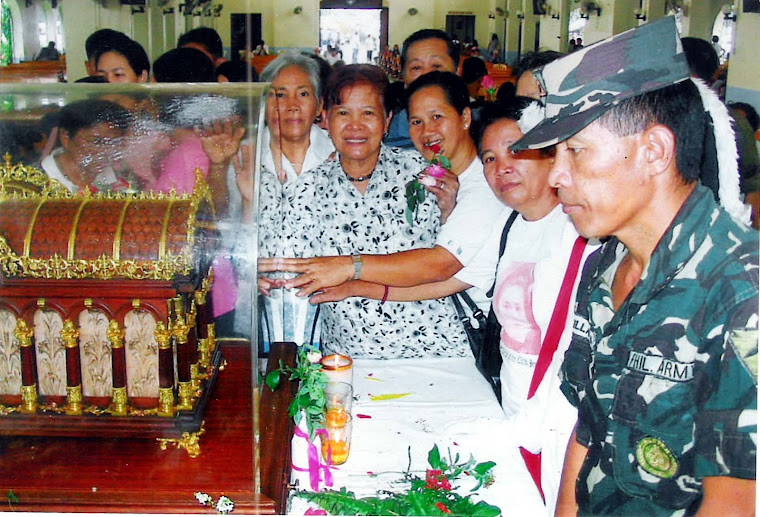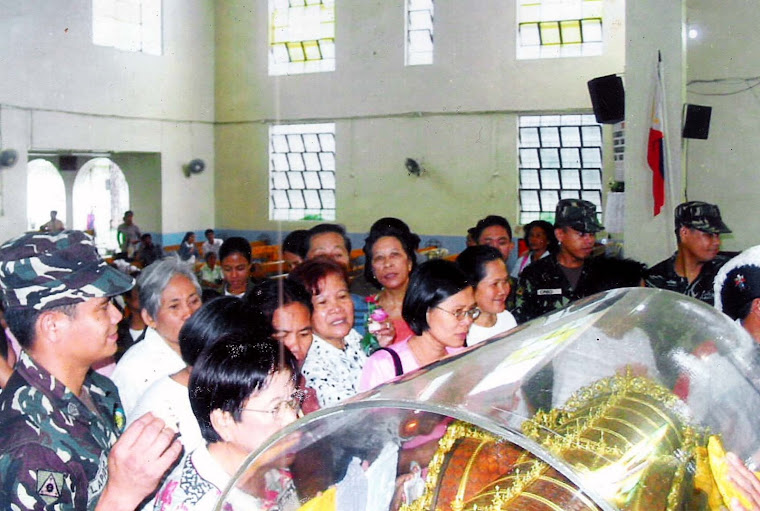There are thousands of canonized saints, that is those individuals officially recognized by the Church as holy men and women worthy of imitation. Because miracles have been associated with these people, and their lives have been fully examined and found holy by the Church, we can be assured they are prime examples of holiness, and powerful intercessors before God on our behalf. There are also many patron saints, guardians or protectors of different areas and states of life.
Christians have been honoring their saints and martyrs since at least the second century AD. The Martyrdom of Polycarp, probably written near the middle of the second century, attests to this reality:
Accordingly, we afterwards took up his bones, more precious than the most exquisite jewels, and more pure than gold, and deposited them in a fitting place, so that when being gathered together, as opportunity is allowed us, with joy and rejoicing, the Lord shall grant us to celebrate the anniversary of his martyrdom, both in memory of those who have already finished their course, and for the exercising and preparation of those yet to walk in their steps (18).
Initially the calendars of saints and martyrs varied from location to location, and many times local churches honored local saints. However, gradually feast days became more universal. The first reference to a general feast celebrating all saints occurs in St Ephrem the Syrian (d. AD 373). St. John Chrysostom (d. AD 407) assigned a day to the feast, the first Sunday after Pentecost, where in the Eastern Churches the feast is celebrated to this day. In the West, this date was probably originally used, and then the feast was moved to May 13th. The current observance (November 1) probably originates from the time of Pope Gregory III (d. AD 741), and was likely first observed on November 1st in Germany. This fact makes the connection of the All Saints Feast with the pagan festival Samhain less likely, since Samhain was an Irish pagan feast, rather than German.
The vigil of the Feast (the eve) has grown up in the English speaking countries as a festival in itself,All Hallows Eve, or Halloween. While many consider Halloween pagan (and in many instances the celebrations are for many), as far as the Church is concerned the date is simply the eve of the feast of All Saints. Many customs of Halloween reflect the Christian belief that on the feast's vigils we mock evil, because as Christians, it has no real power over us. However, for some Halloween is used for evil purposes, in which many Christians dabble unknowingly. David Morrison explains the proper relationship between Christians and Halloween. Various customs have developed related to Halloween. In the Middle Ages, poor people in the community begged for "soul cakes," and upon receiving these doughnuts, they would agree to pray for departed souls. This is the root of our modern day "trick-or-treat." The custom of masks and costumes developed to mock evil and perhaps confuse the evil spirits by dressing as one of their own. Some Christians visit cemeteries on Halloween, not to practice evil, but to commemorate departed relatives and friends, with picnics and the last flowers of the year.
All Souls Day follows All Saints Day, and commemorates the faithful departed, those who die in God's faith and friendship. However, Catholics believe that not all those who die in God's grace are immediately ready for the Beatific vision, i.e. the reality and goodness of God and heaven, so they must be purified of "lesser faults," and the temporal effects of sin. The Catholic Church calls this purification of the elect, "purgatory." The Catholic teaching on Purgatory essentially requires belief in two realities: 1. that there will be a purification of believers prior to entering heaven and 2. that the prayers and masses of the faithful in some way benefit those in the state of purification. As to the duration, place, and exact nature of this purification, the Church has no official dogma, although Saint Augustine and others used fire as a way to explain the nature of the purification. Many faithful Catholics, including Pope Benedict XVI, grant that Purgatory may be an existential state as opposed to a temporal place. In other words, Purgatory may be something we experience instantaneously, because it is outside of the confines of created time and space. Many non-Catholics, including C.S. Lewis, have believed in Purgatory, and the official dogma of Purgatory is hardly offensive, even if the popular understanding of it has led to confusion. As a more everyday explanation, many liken Purgatory to a place to "clean up" oneself before going into the presence of Almighty God.
All Souls is the day to remember, pray for, and offer requiem masses up for these faithful departed in the state of purification. Typically Christians will take this day to offer prayers up on behalf of their departed relatives and friends. Others may remember influential individuals that they never knew personally, such as presidents, musicians, etc. This may be done in the form of the Office of the Dead (Defunctorum officium), i.e. a prayer service offered in memory of departed loved ones. Often this office is prayed on the anniversary (or eve) of the death of a loved one, or on All Souls' Day.
Christians have been praying for their departed brothers and sisters since the earliest days of Christianity. Early liturgies and inscriptions on catacomb walls attest to the ancientness of prayers for the dead, even if the Church needed more time to develop a substantial theology behind the practice. Praying for the dead is actually borrowed from Judaism, as indicated in 2 Maccabees 12:41-42. In the New Testament, St Paul prays for his departed friend Onesiphorus in 2 Timothy 1:16-18. Early Christian writers Tertullian and St. Cyprian testify to the regular practice of praying for the souls of the departed. Tertullian justified the practice based on custom and Tradition, and not on explicit scriptural teaching. This demonstrates that Christians believed that their prayers could somehow have a positive effect on the souls of departed believers. Closely connected to the ancient practice of praying for the dead is the belief in an explicit state called purgatory. The New Testament hints at a purification of believers after death. For example, Saint Paul speaks of being saved, "but only as through fire" (1 Corinthians 3:15). Over time, many Church Fathers, including St. Augustine, e.g. in Enchiridion of Faith, Hope, and Love and City of God, further developed the concept of a purgation of sins through fire after death.
In the early days, departed Christians' names were placed on diptychs. In the sixth century, Benedictine communities held commemorations for the departed on the feast of Pentecost. All Souls' Day became a universal festival largely on account of the influence of Odilo of Cluny in AD 998, when he commanded its annual celebration in the Benedictine houses of his congregation. This soon spread to the Carthusian congregations as well. The day was celebrated on various days, including October 15th in 12th century Milan. Today all Western Catholics celebrate All Souls' Day on November 2, as do many Anglicans and Lutherans. Initially many Protestant reformers rejected All Souls' Day because of the theology behind the feast (Purgatory and prayers/masses for the dead), but the feast is now being celebrated in many Protestant communities, in many cases with a sub-Catholic theology of Purgatory. Some Protestants even pray for the dead; many Anglican liturgies include such prayers. While the Eastern Churches lack a clearly defined doctrine of Purgatory, they still regularly pray for the departed.























No comments:
Post a Comment